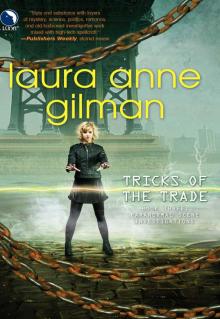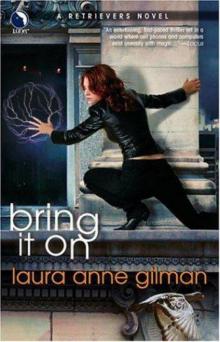- Home
- Laura Anne Gilman
Staying Dead Page 2
Staying Dead Read online
Page 2
“You asking me, or telling me?” Wren asked. She heard the hardness in her voice, and winced inwardly, trying to tone it down a little. Don’t antagonize the witnesses, you idiot! A slight cock of the head to the right, like the bird she was nicknamed for, and a faint smile that could be mistaken for encouragement softened her words.
It worked enough to take the edge off his initial reaction. “They told me there was going to be a full-scale shakedown later today. That says trouble.”
She nodded, shifting her weight slightly to convey interest, and a willingness to hang around and listen to him for as long as he wanted to talk.
“And it had to be last night,” the guard—his name tag read Blair—continued. “’Cause when I came in this morning, Joe had already gone off shift, and there were two guys here in way-too-expensive suits, working the desk instead of him. And here you are, full clearance pass, asking to see my log book. So, you with FullTec?”
The name was familiar from her predawn briefing materials. FullTec was the name of the company that had installed the security system for this building back when it was built in 1955, and rewired it every ten years or so thereafter. She’d checked them out online, too. They’d been ahead of their time even then, and were still riding the cutting edge of security technology now. No building wired by them had ever been broken into, held hostage, or otherwise menaced. The upper level executives who gathered for multibillion-dollar conference calls rested easy in a FullTec building. Said so right on their Web site.
But, according to her job notes, they hadn’t been the ones to prepare the missing item. Which meant that they—probably—didn’t know anything at all about the special protections built into it. That had been Talented work: a mage, probably, or maybe one of the earliest lonejacks. Special protections that kept the owner, the ruler of this little financial empire, safe and secure in his dealings with the outside world.
A protection that had disappeared at 11:32 p.m. last night.
She banished those thoughts for later, returning her full attention to the guard and the here-and-now.
“No, actually, I’m a freelancer. Called in special to double-check some of the systems.”
Blair nodded his head, sagely impressed. The tie was definitely silk. “Ah. Watching the watchdogs, huh?”
“Something like that, yeah.”
“So, you a tech? Some kind of whiz-kid hacker?”
Wren laughed, thinking of Sergei’s caustic comments while he watched her fumbling attempts to upgrade her computer last weekend. Current—the power source of magic—screwed with electronics, so her relationship with her computer was at best user-cautious. “Nope.” She paused, a germ of mischief making her tell this poor bastard the truth. “I’m a thief.”
Twenty minutes later, she was alone with the main control box for the building’s wiring system. The guard had laughed at her words, but the look in his eyes had been cool, and suddenly she’d been given an escort down into the basement. Not Rafe, either. A new guy, still polite but bulkier and much less cute. Not quite a goon, but with definite goonlike tendencies only barely tamed by the neatly pressed blue blazer that didn’t quite hide the bulk of a stun gun at his hip. Nor, she suspected, was it supposed to.
“That’ll teach me to be honest,” she muttered, opening the box and surveying the neatly laid-out and labeled assortment of wires. A stun gun would only take her out for about half the time of a normal human, since her body was used to channeling electrical energy in the search for current, but it would still be unpleasant, if she were taken unprepared. “Sergei’s right. Never gets me anywhere except in trouble.”
“Did you say something, miss?”
“No, nothing, sorry. I talk to myself when I work. Just ignore me.”
And she wasn’t really a thief, anyway. She was a retriever, thank you very damn much. A person, as Sergei would say, of specialized skills, who could bring objects back to their rightful—the client was always rightful—owner without the fuss of a police investigation, or the bother of insurance companies getting involved. Sergei had a way of making everything sound so damn high-class.
All right, so sometimes a legality or two got bent out of shape, in the course of a retrieval. But bending wasn’t breaking. Not so long as she wasn’t caught, anyway. And nobody told her mother.
Reaching out, Wren traced a wire gently, pressing just enough to make it resist her touch. According to the label under it, this section of wires connected to the fire alarm system. Probably not what she was looking for, since those things were notoriously temperamental. Dropping her hand several inches, she came to the security alarm. Again, not likely. That would have been the very first thing they would have checked.
When he’d called with the details, Sergei had made it clear to her that the client wanted this done with an absolute nil of noise. Which meant, ideally, she’d be the only one on the job. But the guard’s words indicated, to no real surprise at all, that that was already screwed. If the “mondo suits” at the board this morning hadn’t been Mage Council troubleshooters, high-powered magic-users-for-hire, she’d eat her hat, if she owned one. Oh well. Never assume the client’s going to tell you the truth. Especially if it involves anything that might actually let you get the job done.
But she had one advantage—high-powered magic-users tended to think in high-powered ways. Which she didn’t, as a rule. Start low on the spectrum, work your way up. Nobody uses more power than they have to. Call it Valere’s Strop to Occam’s Razor.
Closing that control box, she opened the one directly below it and snorted without amusement. The labeling confirmed her initial suspicion: the electrical system for the entire building. Everything that had an On button was initially powered from this one place. She tsked under her breath. Sloppy, sloppy. With the quick close-and-yank of current, she could give every overworked, underpaid secretary a day off.
And then end up explaining to Sergei why the job went south. From a jail cell. Not one of your better impulses, no.
Reaching in, she touched her index finger to one of the wires, and instantly felt a familiar answering hum in the blood running under the skin. You could describe magic any way that worked, and one mage’s science was another wizzart’s chaos. It all boiled down to using the existing energy that was generated by almost everything knocking about the universe. Call it electricity, call it life force, or chi: hell, call it Norman if it works. Wren didn’t pay much attention to any of the various and contentious schools of magic theory. She wasn’t much for schooling, period. You used what you had.
Every human living could use magic—theoretically. In actual practice, only a small portion of the population could conduct the charge, like living lightning rods, and an even fewer percentage of them were what her mentor had called pure conductors. Pures were the elite, the ones who made it to full mage status. They were generally co-opted by the Council, the strongest and most secretive union ever to collect dues. The rest of the magic-using population muddled along at various levels of ability, doing the best they could, finding their strong points and sticking to them.
Technically Wren was a pure, but she didn’t see the point in bragging on it. It was like having a high IQ—wasn’t much unless you worked it, did something with it. Drawing down the power was easy for her, siphoning off the energy from an external source to flow through her, as though she were running water through her hands. Any source would do, but current that was already tamed and channeled made it so much easier. Like called to like—energy was energy, and where there was one, there was the other. The electronic age was a godsend to magic users, despite what the fairy tales said. If she’d been a little better at channeling out what came in, she’d have been Council material for sure. The thought still made her shudder.
Five fingers now extended, she touched wires at random, discarding anything that sang back to her, looking for a discordant note, something that might indicate a flaw, a clog…or the remnant of supernatural tinkering. In short: look
for an elemental.
“Ah-hah!” she said as her thumb grazed a wire that felt different from the others. “Gotcha, you sneaky little…” Pushing with that finger, she listened to the difference.
Elementals were exactly what they sounded like—entities that existed in an elemental state. Very small, and barely sentient, they were nonetheless useful, if you knew how to coax them. Now that she had a handle on one, Wren could sense a flurry of elementals within the wire she had tapped—hardly surprising. Barring a thundercloud, there were few places an elemental flocked to like a live wire; it must be like an amusement park, or an opium den to them, pick your metaphor. Now, to see how long they had been there, and if they’d noticed anything.
“Right. Come to mama…”
Having already gone into the fugue state once that morning, it was like stepping off a curb to find it again. No thought, no effort, just a sudden snapping into awareness, chasing glittering tendrils up and down her neural paths…
“Excuse me, miss?”
She blinked, shaken out of her intense concentration by the goon placing a paw on her shoulder. He looked nervous.
“Yes?”
“I’m sorry, but, whatever it is you’re doing—could you stop? They’re reporting power outages on several floors….”
Wren grinned sheepishly. “Right. Sorry.” She must have gone too deep, and drained some of the charge down accidentally. She flexed her neck and arched her back as though to straighten out stiff muscles, feeling for the natural current within herself. It hummed and snapped with vigor, confirming her suspicion. She’d gone for an automatic skim, copping a buzz off the charge of magic that could be found even in man-made electricity and storing it in the pool that every current-sensitive person carried, knowingly or not, within them.
Oops. Technically, that would be theft. Never a good idea, to steal from your employers. Probably on the level of office supplies; a pen here, a ream of paper there…Wren shook her head, dismissing that train of thought. It didn’t matter. She had gotten what little information was there. The trick now was going to be figuring out what it all meant, if anything.
Making nice to the goon-guard so that he would “forget” about what he hadn’t really seen anyway took a few minutes. Then she was riding up in the freight elevator, back up to the main lobby. It was crowded with suits now, male and female, armed with briefcases and brown paper bags, some of them already open to let loose the aroma of fresh-brewed Starbucks, or the cheaper stuff from one of the ubiquitous corner bagel carts. The starting bell had rung, and all’s well with the corporate world. Wren shook her head, moving against traffic. How the hell did people live like this?
It was with decided relief that Wren left her security badge with the guard at the front desk and went home. Now the real work—the fun stuff—could begin.
two
The message light on her answering machine was blinking, a quick red flash that caught her eye the moment she came in the door. She dropped her keys in the small green ceramic bowl on the counter of her square little kitchenette, her mail next to that, and reached over to press the play button.
Opening the fridge, Wren pulled out the orange juice, pouring a long draught down her throat without bothering to get a glass.
“Wren, it’s 9:15.” Sergei’s perfectly enunciated voice filled the sparse confines of her kitchenette, almost as though he were actually there. “I just accessed your account, and half of your fee has been deposited, as agreed upon.”
She raised the O.J. carton in salute to that fact.
“Need I remind you that the client is paying for a timely resolution to this situation?”
Sergei never referred to them as cases, or jobs. No, the “client” had a “situation.” Situations paid better.
“Jesus wept, Sergei. Even Christ took three days to rise from the dead! Gimme a break here!”
“And need I remind you that today is the thirteenth? Please mail your rent check today.”
“Yeah yeah, I already have a momma nag, I don’t need another,” she complained to the empty apartment as the tape clicked off. Not that it wasn’t sort of nice, having someone to remind her of the stuff that always managed to slip her mind. Like dropping a check in the mail.
That was the way their partnership worked, too. Sergei handled the money side of it, set up the deals, worked the angles. She did the jobs—or, in Sergei’s parlance, “rectified the situations.” The stuff that took Talent, as opposed to talent. From each according to their abilities, although she had been known to bargain sharply, and Sergei wasn’t above getting his hands a little dirty, if needed. She knew for a fact that the man lied with the fluidity and believability of a gypsy prince if it suited him.
A nice skill for your agent to have. It had certainly saved their asses more than once, including one memorable evening where he had played both her father and her husband to two different people in the space of an hour. He hadn’t been sure which role was more annoying, especially when she insisted on calling him “dad-dikins” for the rest of the month.
The memory of that made her smile, the comforting awareness of Sergei as always tucked somewhere along her spine. It wasn’t anything particularly magical; just the knowledge born of ten years’ partnership that, all joking aside, he was there for her, that all she had to do was yell.
Well, maybe it was a little bit magical. Sergei wasn’t a total null, and maybe she’d sampled a little more of his internal energies than she’d ever told him about…but it was only so that she’d be able to pick him out in a dark room, in a crowd, if the need ever arose.
Not that she’d ever admit to needing him, even when she was asking. Bastard would enjoy that far too much. He’d be more than happy to take over handling her personal finances, too, if she let him. It wasn’t that he didn’t think she was capable. She hoped, because otherwise she’d have to kill him. He just…was overprotective that way. Every way. Sometimes she thought he still saw her as the seventeen-year-old she’d been when they first hooked up, her still foundering in her abilities, and him with a pair of severely pissed-off mages on his tail.
Putting the orange juice back into the fridge, Wren turned out the light in the kitchen with a casual slap of the hand against the switch as she went across the narrow wood-floored hallway and into the main room. She turned on the stereo, letting the soft jazz clear out the silence. The music tugged at the tension between her shoulder blades, pulling it down off her body. A world with saxophones in it wasn’t a bad world at all.
Other than the stereo, two huge speakers, and a comfortable brown tweed armchair, the room was empty of furniture. The acoustics of the room were—astoundingly—perfect. It would have been blasphemy to in any way disturb it.
Her fifth-floor walkup had five rooms—downright palatial by Manhattan standards, even if the rooms themselves were tiny. In addition to the music room and kitchenette, there were three shoebox bedrooms against the back wall, each with its own window that overlooked the brick wall of the next building over. A bathroom with facilities that had been upgraded within the last decade sent the rent soaring from barely reasonable to moderately painful.
Okay, so maybe the neighbors weren’t all they could be, in terms of minding their own business. The five flights of stairs were murder, especially in the summer. And the sounds of traffic from over on Houston Street could be pretty bad. Wren didn’t care. Two years ago she had walked in the door half a step behind the real estate broker, a hyperkinetic woman glued to her cell phone, and had felt a sense of comfort soak into her bones, like walking onto a ley line, those semi-legendary sources of power. This was home. This was her sanctuary. The moment the building went co-op, as every decent apartment building seemed to, sooner or later, she was going to buy her apartment. That’s where all of her money went, right into the savings account that was not ever, on pain of pain, touched. No vacations, no expensive toys or impulse splurges.
Well, maybe a few. Mostly, though, she stole what she really wa
nted. Just to keep her hand in, of course.
Wren was a pragmatist. She was very good at what she did, but no career goes on forever. Especially not one with risks like hers. So she planned. And prepared. And kept praying that human nature would maintain a demand for her particular skills.
So far, no problem on that front. Someone always wants what they’re not supposed to have, and someone’s always equally willing to pay to get that something back.
Setting the volume level to where she could hear the music throughout the apartment, Wren grabbed the mail off the counter, sorting it as she walked down the hallway into the bedroom that was set up as her office. “Phone bill, credit card, junk junk junk, more junk, political junk.” She tossed all but the bills into the recycling bin next to the desk, and thumbed through the flyers that had been stuck in the doorjamb, setting aside one menu and tossing the rest into the bin. That was the third flyer she’d gotten for pest removal. At this point, they were more annoying than her nonexistent cockroaches, current being a great and totally—in her mind—underutilized way to keep a location insect-free.
“If I could only market that little side effect right,” she told the photo of her mother tacked to the board on the wall in front of her, “I’d be able to make us both filthy rich overnight. And Sergei, too.”
The office was the largest of the three bedrooms, but barely managed to hold the small dark wood desk where her computer and a headset phone reigned, a comfortably upholstered office chair, and a tall potted plant against one wall. The corkboard hung on the wall over the desk was cluttered with papers, takeout menus, and the one posed photo of her mother. Five two-drawer file cabinets marched along the opposite wall, pulling double-duty as a table for an assortment of odd but useful objects she didn’t know where else to put. That wall also held a closet. Its door had been removed, and half a dozen shelves installed, to serve as a makeshift bookcase. The window was covered by a rice paper shade, allowing light during the day, but keeping prying eyes out 24/7.

 West Winds' Fool and Other Stories of the Devil's West
West Winds' Fool and Other Stories of the Devil's West Gabriel's Road
Gabriel's Road Morgain's Revenge
Morgain's Revenge The Shattered Vine
The Shattered Vine Laura Anne Gilman - Tales of the Cosa Nostradamus
Laura Anne Gilman - Tales of the Cosa Nostradamus The Camelot Spell
The Camelot Spell VISITORS
VISITORS Staying Dead
Staying Dead Silver on the Road
Silver on the Road Weight of Stone
Weight of Stone Promises to Keep
Promises to Keep Tricks of the Trade psi-3
Tricks of the Trade psi-3 Blood from Stone
Blood from Stone Soul of Fire tp-2
Soul of Fire tp-2![Pack of Lies [2] Read online](http://i1.bookreadfree.com/i1/04/01/pack_of_lies_2_preview.jpg) Pack of Lies [2]
Pack of Lies [2] Burning Bridges
Burning Bridges The Work of Hunters
The Work of Hunters Miles to Go
Miles to Go Pack of Lies psi-2
Pack of Lies psi-2 Tricks of the Trade
Tricks of the Trade Hard Magic
Hard Magic Bring It On
Bring It On Darkly Human
Darkly Human The Cold Eye
The Cold Eye An Interrupted Cry
An Interrupted Cry Soul of Fire
Soul of Fire Hard Magic psi-1
Hard Magic psi-1 The Shadow Companion
The Shadow Companion Flesh and Fire
Flesh and Fire